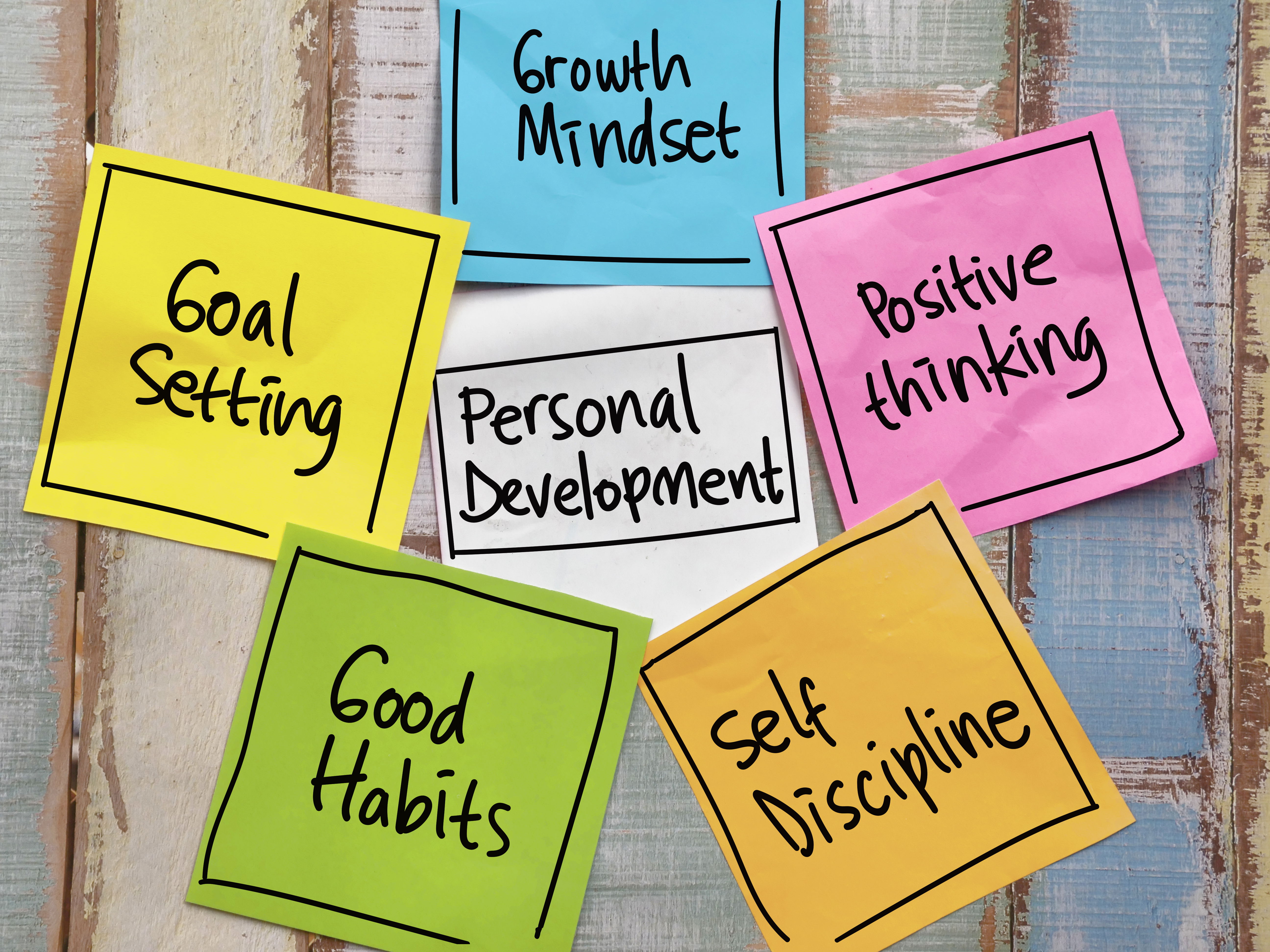How to Set Personal Development Goals
Let's Discuss About Personal Development Goals
Let's dive into the exciting world of personal development goals. Imagine this as our little chat over a cup of coffee, where we explore how setting these goals can transform your life.
Personal development is all about becoming the best version of yourself. It encompasses improving your skills, enhancing your knowledge, and working on your overall well-being.
But where do you start? That's where personal development goals come in. They act as your roadmap, guiding you towards growth and self-improvement.
Setting personal development goals is crucial because it gives you direction and purpose. It helps you focus on what truly matters and encourages you to take proactive steps toward your aspirations. In this post, we will discuss how to set personal development goals and provide strategies to help you reach them.

Understanding Personal Development Goals
What Are Personal Development Goals?
Personal development goals are specific, actionable objectives you set for yourself to improve various aspects of your life. These goals can range from enhancing your professional skills to fostering better relationships and promoting overall well-being. Essentially, they are the stepping stones that lead you to a more fulfilled and successful life.
For example, a personal development goal in the workplace could be improving your communication skills to enhance team collaboration. On a personal level, you might aim to develop a daily meditation practice to reduce stress and increase mindfulness. The key is to tailor these goals to your unique needs and aspirations.
Why Are Personal Development Goals Important?
Setting personal development goals is like giving yourself a GPS for life. Without clear goals, it's easy to wander aimlessly, feeling stuck or unfulfilled. Here are some benefits of setting personal development goals:
- Direction and Focus: Goals provide a clear path and help you prioritize what's important.
- Motivation: Having specific targets keeps you motivated and driven to achieve them.
- Accountability: Goals hold you accountable for your actions, making it easier to track progress.
- Personal Growth: By constantly working on your goals, you foster continuous self-improvement and personal growth.
Steps to Setting Effective Personal Development Goals
How to Set Personal Development Goals That Work
Assess Your Current Situation
Before setting goals, it's essential to understand where you currently stand. Self-assessment helps you identify your strengths, weaknesses, and areas for improvement. Reflect on your recent achievements and challenges. Ask yourself:
- What skills do I excel at?
- In which areas should I enhance my skills?
- What are my passions and interests?
This self-awareness will serve as the foundation for your personal development goals.
Define Clear and Specific Goals
Vague goals lead to vague results. When setting personal development goals, be clear and specific about what you want to achieve. Instead of saying "I want to be healthier," say "I want to run a 5K in under 30 minutes." Make your goals specific and measurable.
Clear goals provide a concrete target to aim for, making it easier to plan and measure progress.
Make Your Goals Measurable
Measurable goals allow you to track your progress and stay motivated. When you can see tangible results, it boosts your confidence and keeps you focused. Measure your achievements using specific metrics. For example:
- Instead of "I want to read more," try "I want to read one book monthly."
- Instead of "I want to save money," try "I want to save $500 by the end of the year."
Set Achievable and Realistic Goals
While it's great to aim high, setting unrealistic goals can lead to frustration and burnout. Ensure your goals are challenging yet attainable. Consider your current resources, time, and energy levels. Setting small, achievable goals and reaching them regularly is more effective than setting ambitious goals and quitting.
Ensure Your Goals Are Relevant
Your goals should align with your values, interests, and long-term objectives. They should be meaningful to you, not just something you think you should do. Relevant goals keep you motivated because they resonate with your aspirations.
For example, if you're passionate about writing, a relevant goal could be to complete a writing course to improve your skills.
Time-Bound Goals
Setting deadlines for personal development goals helps us stay on task, and avoid delays. Be sure to assign specific timeframes to each goal. This helps you stay on track and ensures you make steady progress. For instance, "I want to complete an online course on public speaking within three months."

Strategies for Achieving Personal Development Goals
Strategies to Achieve Your Personal Development Goals
Create an Action Plan
An action plan breaks down your goals into manageable steps, making it easier to achieve them. Start by listing the tasks you need to complete to reach your goal. Then, prioritize these tasks and set deadlines for each one.
For example, if your goal is to learn a new language, your action plan could include:
- Research and choose a language course (Deadline: 1 week).
- Enroll in the course (Deadline: 2 weeks).
- Complete weekly lessons (Ongoing).
- Practice speaking with a language partner (Start in 1 month).
Stay Motivated and Committed
Maintaining motivation is key to achieving your personal development goals. Here are some tips to stay motivated:
- Visualize Success: Picture yourself achieving your goals and enjoying the benefits.
- Set Milestones: Break your goals into smaller milestones and celebrate each achievement.
- Stay Positive: Surround yourself with positive influences and remind yourself of your progress.
- Seek Support: Share your goals with friends or join a support group to stay accountable.
Keep in mind, that obstacles are a part of the journey.. When you face obstacles, view them as learning opportunities rather than failures.
Track Your Progress
Regularly reviewing your progress helps you stay on track and make necessary adjustments. Use tools like journals, apps, or spreadsheets to monitor your achievements. Consider what was successful and what was not. This self-evaluation keeps you focused and motivated.
Adjust and Adapt
Life is full of uncertainties. At times, you might have to alter your objectives. Stay open-minded and ready to adjust your plans as things change. If you encounter unexpected challenges, reassess your goals and make adjustments as needed. The key is to stay committed to your overall growth and keep moving forward.
Examples of Personal Development Goals
Examples of Personal Development Goals for Inspiration
Personal Development Goals in the Workplace
Setting personal development goals in the workplace can enhance your career and job satisfaction. Here are some examples:
- Improve Communication Skills: Take a course on effective communication to enhance your interactions with colleagues and clients.
- Learn a New Software: Master a new software relevant to your field to increase your productivity and value to your team.
- Develop Leadership Skills: Attend leadership workshops or take on a mentorship role to grow your leadership capabilities.
Setting and reaching goals can help you grow at work, create a good work atmosphere, and find better job chances.
Personal Development Goals for Managers
Managers play a crucial role in guiding their teams and fostering a productive work culture. Here are some goals for managers:
- Enhance Decision-Making Skills: Participate in decision-making training to make more informed and strategic choices.
- Improve Team Collaboration: Implement team-building activities to strengthen relationships and improve teamwork.
- Develop Conflict Resolution Skills: Learn conflict resolution techniques to handle workplace disputes effectively.
These goals help managers lead their teams more effectively and create a harmonious work environment.
Personal Development Goals for Personal Life
Personal development goals extend beyond the workplace and can significantly impact your overall well-being. Here are some examples:
- Practice Mindfulness: Incorporate mindfulness exercises into your daily routine to reduce stress and improve mental clarity.
- Try a Hobby: Painting, gardening, or playing an instrument to be more creative and relaxed.
- Improve your physical health: Setting fitness goals like running a marathon, joining a yoga class, or eating healthier.
These goals contribute to a balanced and fulfilling life, enhancing both your personal and professional spheres.

Tips for Maintaining Personal Development Goals
Tips for Maintaining Your Personal Development Goals
Stay Accountable
Accountability is crucial for staying on track with your goals. Here are some methods to stay accountable:
- Accountability Partners: Partner with someone who shares similar goals and check in with each other regularly.
- Join a Group: Join a group or community with like-minded individuals who can offer support and encouragement.
- Self-Accountability: Keep a journal to track your progress and reflect on your achievements and challenges.
Being accountable increases your commitment and helps you stay focused.
Celebrate Your Achievements
Celebrating your successes, no matter how small, boosts motivation and morale. When you reach a milestone, take the time to acknowledge your hard work and reward yourself. This could be as straightforward as indulging in a delicious meal or taking a day off for some relaxation.
Recognizing your progress reinforces positive behavior and keeps you motivated to continue working towards your goals.
Keep Learning and Growing
Personal development is a lifelong journey. To maintain your goals, embrace continuous learning and growth. Here are some ways to keep learning:
- Read Books: Read books on personal development, self-improvement, and other topics of interest.
- Attend Workshops: Participate in workshops, seminars, and conferences to gain new insights and skills.
- Online Courses: Enroll in online courses to expand your knowledge and stay updated with the latest trends.
Continual learning keeps you engaged and ensures that you're always moving forward in your personal development journey.

Conclusion
Start Setting Your Personal Development Goals Today!
Setting personal development goals is essential for achieving personal and professional growth. These goals provide direction, motivation, and accountability, helping you become the best version of yourself. Now that you have a clear understanding of how to set and achieve personal development goals, it's time to take action.
- Reflect on Your Current Situation: Spend some time assessing your strengths, weaknesses, passions, and areas for improvement. Understanding your starting point is crucial for setting effective goals.
- Define Your Goals: Clearly articulate what you want to achieve. Remember to make your goals specific, measurable, achievable, relevant, and time-bound (SMART).
- Create an Action Plan: Break down your goals into smaller, manageable steps. Set deadlines for each step and stay organized.
- Stay Motivated: Visualizing your success, setting goals, and getting support from friends, family, or accountability partners.
- Track Your Progress: Regularly review your progress and make adjustments as needed. Use tools like journals, apps, or spreadsheets to keep track of your achievements.
- Celebrate Your Successes: Recognize and celebrate your progress, no matter how small. Reward yourself for reaching milestones to stay motivated.
- Keep Learning: Embrace continuous learning and growth. Read books, attend workshops, and take courses to expand your knowledge and skills.
Remember, the journey to personal development is ongoing. This is about persistently striving to better yourself and reach your objectives. Thus, begin today, make incremental progress, and observe as you evolve into the optimal version of yourself.
Source Links
Harvard Business Review:
- Article: "The Science of Setting Goals"
- Description: Explores the psychological principles behind effective goal setting, offering insights into how to create goals that drive performance and personal growth.
Forbes:
- Article: "Why SMART Goals Don't Work"
- Description: Analyzes the limitations of SMART goals and suggests alternative strategies for effective goal setting.
American Psychological Association:
- Article: "Making Your New Year's Resolutions Stick"
- Description: Provides evidence-based strategies for setting and maintaining goals, emphasizing the importance of planning and adaptability.
Entrepreneur:
- Article: "How to Set, Track, and Achieve Your Goals"
- Description: Explains the importance of tracking progress and adapting goals as needed, offering practical advice for goal management.
TED Talks:
- Talk: "The Power of Accountability Partners"
- Description: Discusses the role of accountability partners in achieving goals and how they can provide support and motivation.